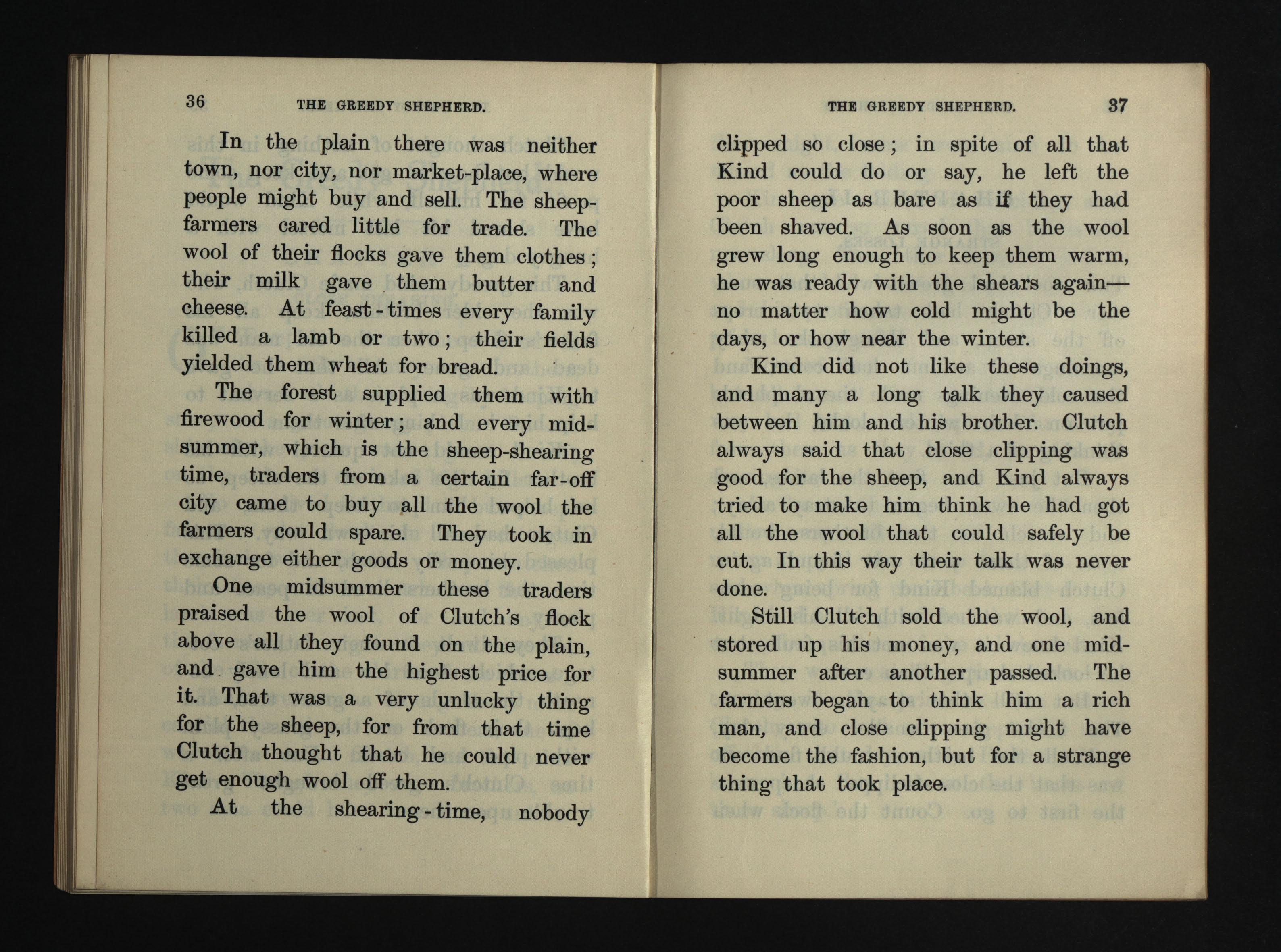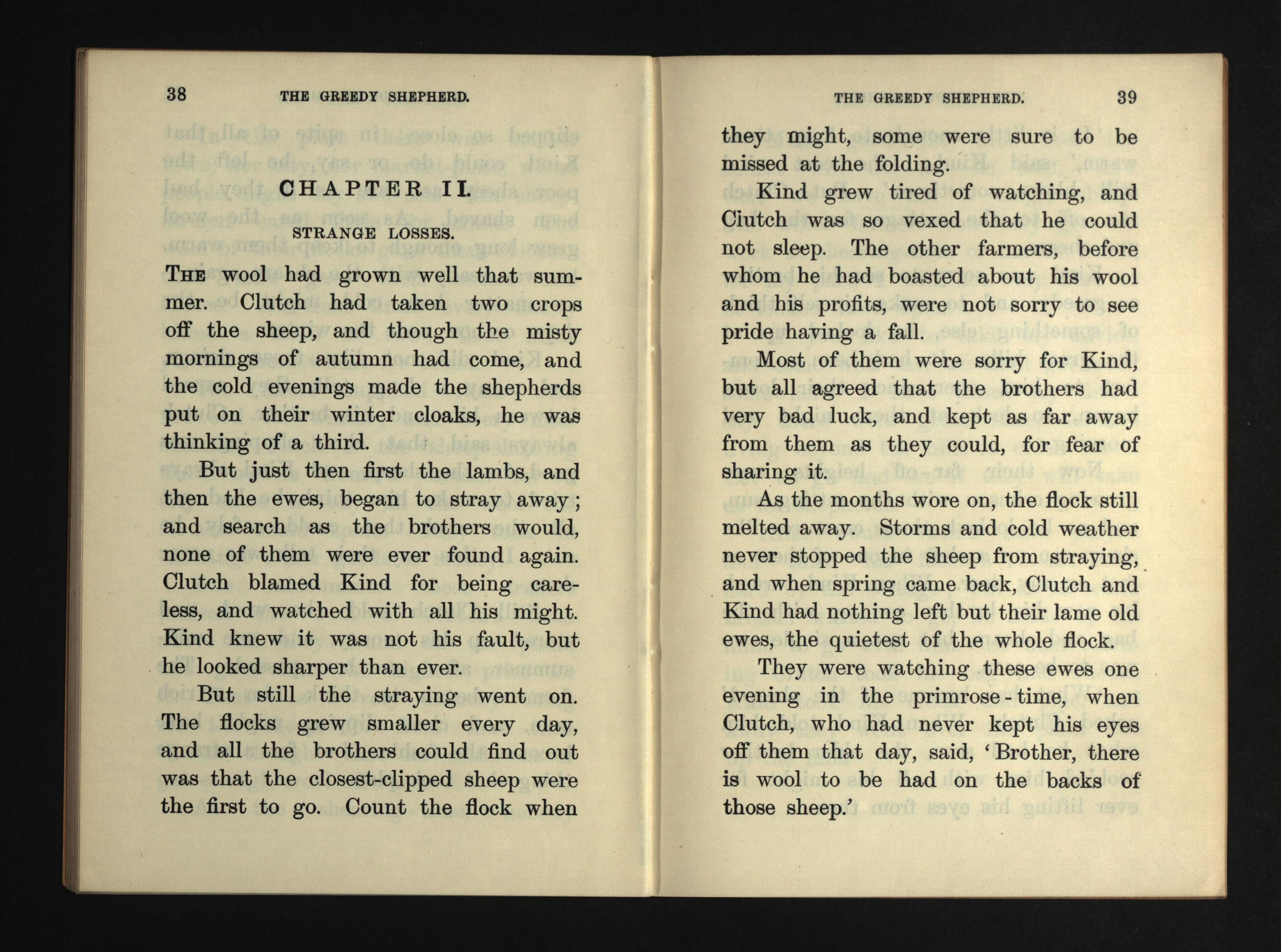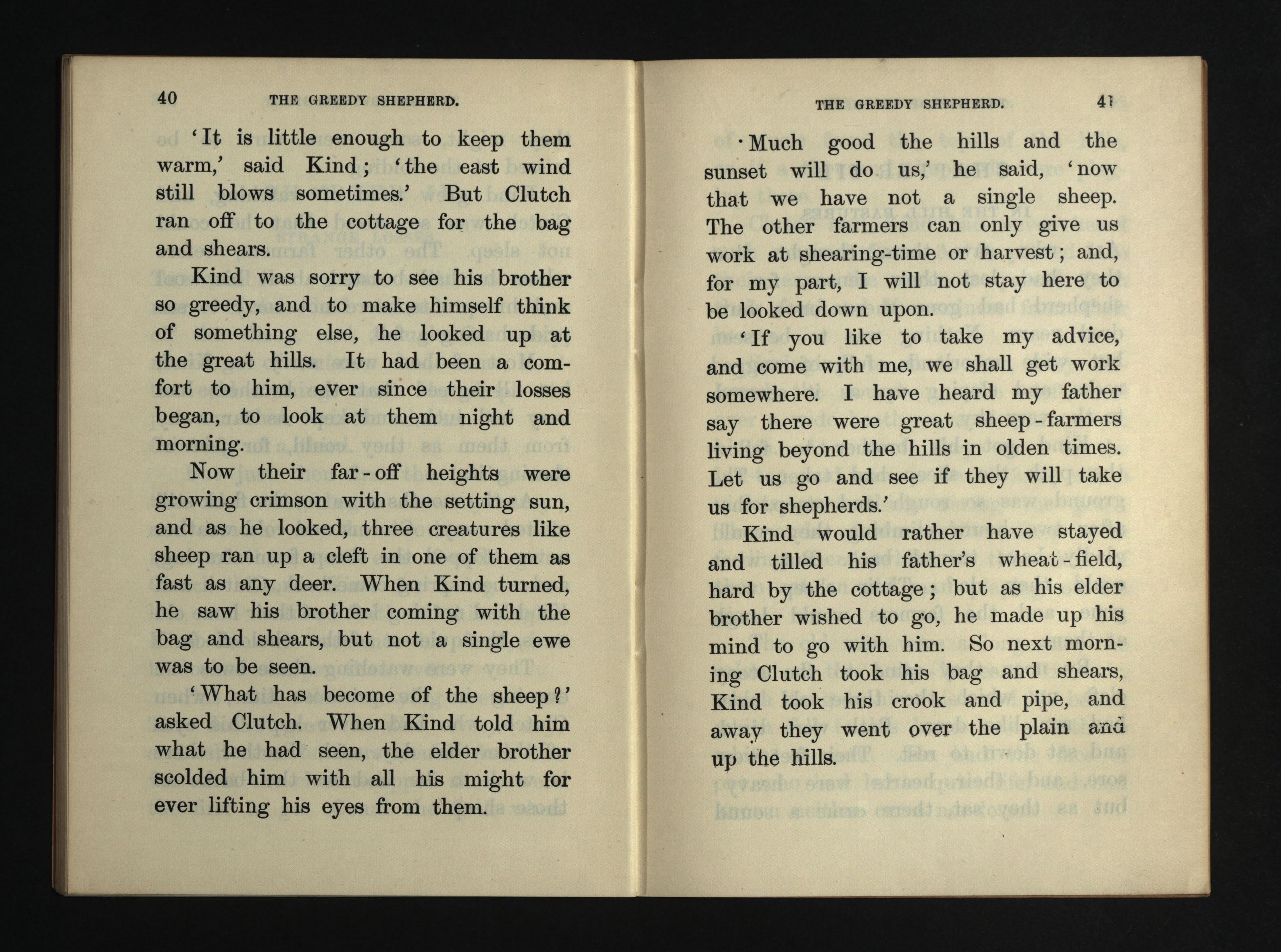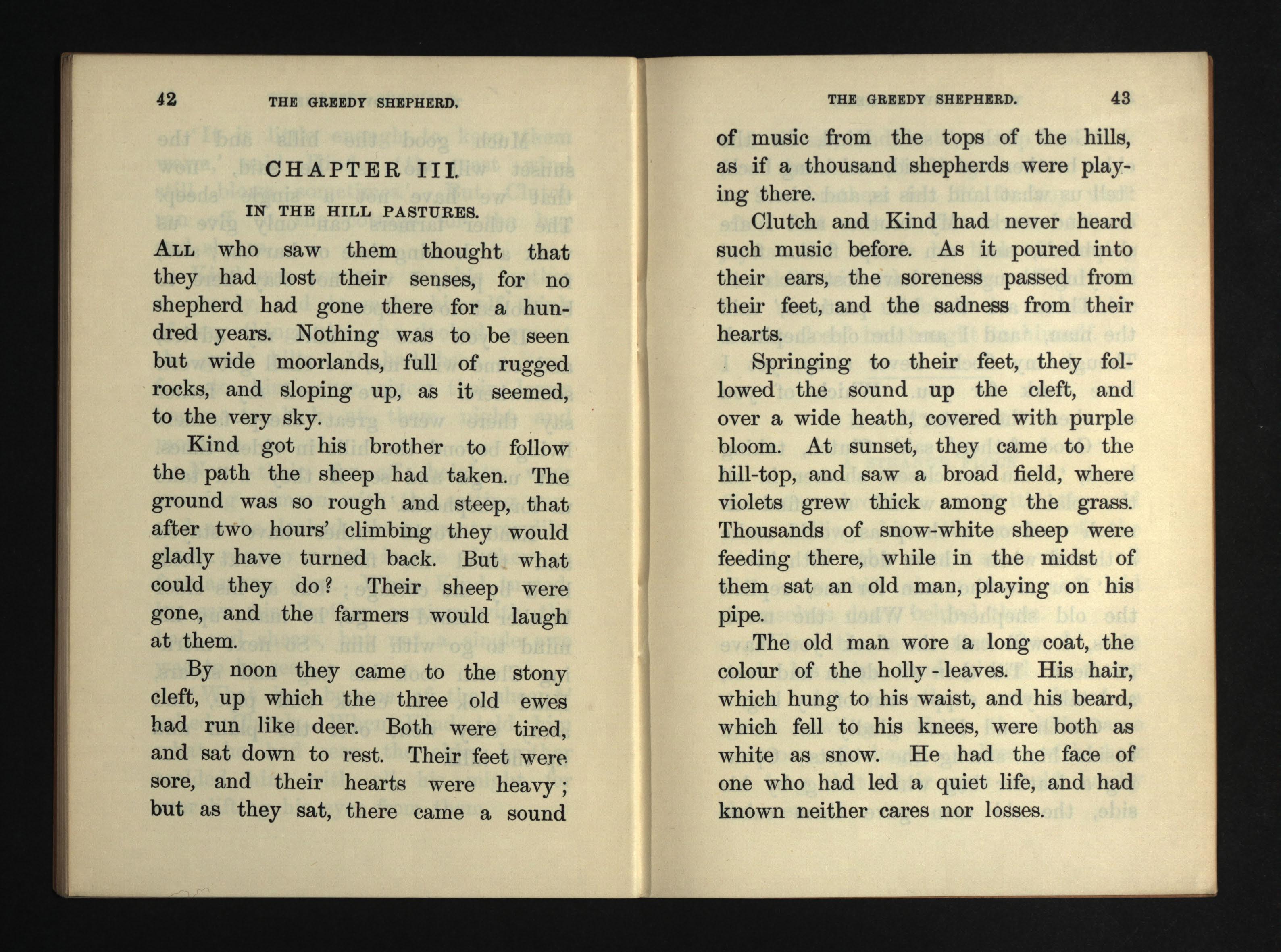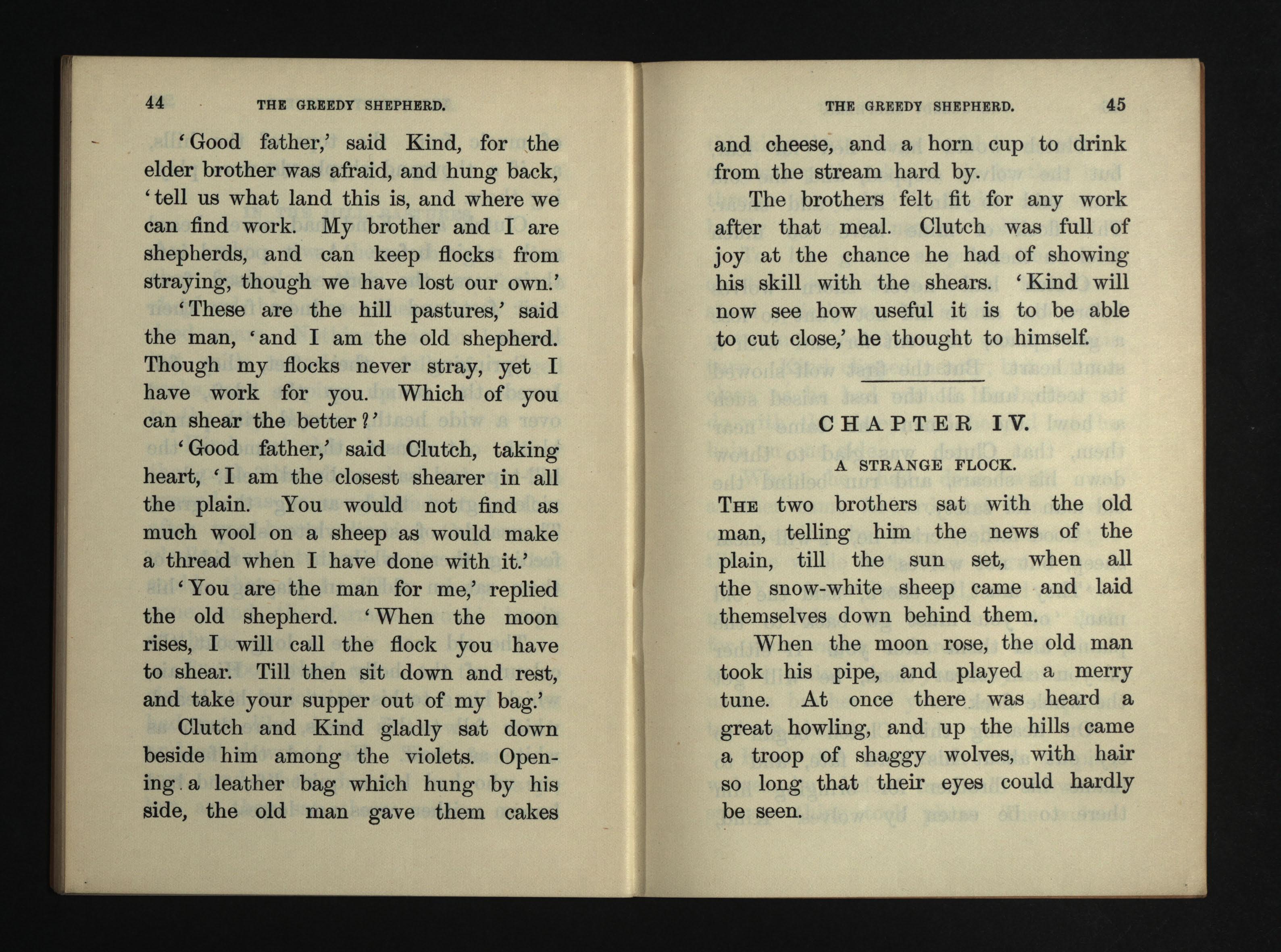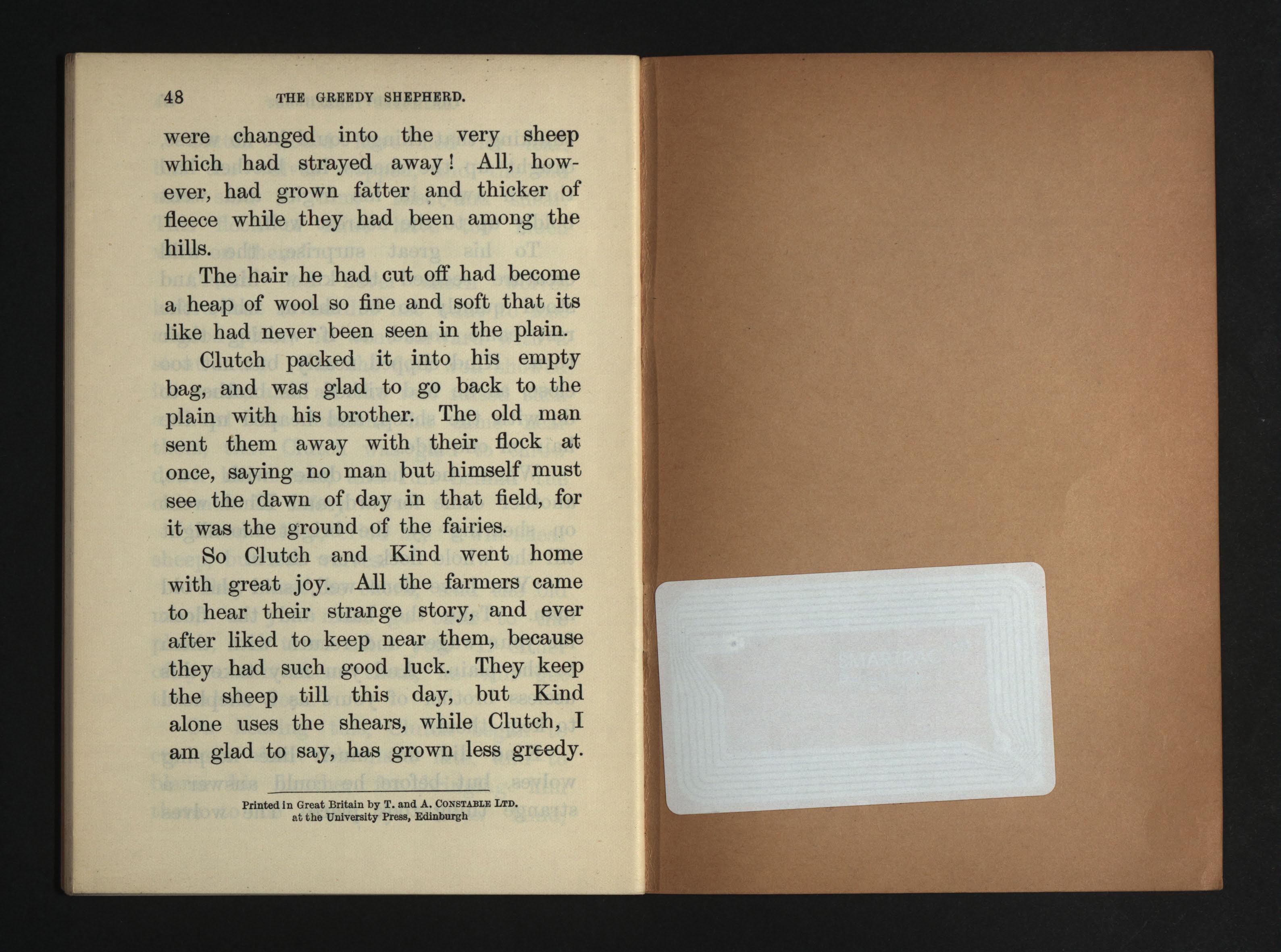


The Story of Fairyfoot.
CHAPTER T.
FAIRY FOOT'S BIRTH.
ONCE upon a time, far away in the west country, there stood a town called Stumpingham. It contained seven windmills, a king's palace, a market-place, a prison, and everything else that befits the capital of a kingdom.
A fine city was Stumpingham ; indeed, the people who lived there thought it the finest city in the world. I t stood in the midst of a great plain, which, for nearly ten miles round the city walls, was covered with orchards and smiling corn-fields.
Beyond these lay a great belt of pasture land, nearly twenty miles broad, and this in its turn was

THE STORY OF FAIRYFOOT.
bounded by a forest so wide and thick, that no man in Stumpingham knew how wide it was. Indeed, many of the people in the city thought that it reached to the end of the world.
There were good reasons why they should think so. In the first place, it was well known that the forest had long been the home of the fairies, and therefore even the bravest of men did not care to go far into it.
In the second place, the people of Stumpingham did not care to travel; men, women, and children had feet so large and heavy that they could not walk well. Whether it was because of something in the place, I cannot tell, but great feet had been the fashion there for hundreds of years, and the nobler the family the larger the feet.
It was, therefore, the aim of all who were above the rank of shepherds and such-like people, to make their feet as large as they could. So well did they
THE STORY OF FAIRYFOOT. 5
succeed, that the slippers of some rich persons often served as sleeping-places for the cat and her kittens.
Stumpingham had a king of its own, and his name was Stiffstep. His family was very old, and very, very large- footed. His people called him 'Lord of the World,' and every year he made a grand speech to them about the mighty land over which he ruled.
His queen, Hammerheel, was looked upon as the greatest beauty in Stumpingham, for her shoe was not much less than a fishing-boat. Their first six children were every bit as handsome as their parents, but their seventh child was a great grief to them.
For a long time after · its birth nobody about the palace could understand what was the matter-the ladiesin-waiting seemed so much troubled, and the king looked so angry.
At last, however, it was through the city that · the queen's
THE STORY OF FAIRYFOOT.
seventh child had been born with such small feet that the like had never been seen or heard of before. 'Only fairies have feet like those,' said the wise people who saw them.

CHAPTER 11.
HOW F AIRYFOOT GOT HIS NAME.
NEVER before in the histOJ;'y of Stumpingham had a king's son been born with such tiny feet. The common people thought that some great trouble was going to befall the city; the learned men began to write books about it; all the frie:s.ds of the king and queen came to the palace to mourn with them over the sad event.
All the lords and ladies of the court, and most of the people in the city, joined in the mourning. At the end of seven days, however, they began to think that all their tears
THE STORY OF FAIRYFOOT. 7 were of no use, and so the friends went back to their homes, and the people took to their work.
If the learned men's books were written, nobody ever read them; and to help the queen to get over her sorrow, the young prince was sent out to the pasture lands, to be brought up among the shepherds.
The chief man there was called Fleecefold, and his wife's name was Rough Ruddy. They lived in a snug cottage with their son Blackthorn and their daughter Brownberry, and were looked upon as great people, because they kept the king' s sheep. Moreover, Fleecefold's family was known to be a very old one; and Rough Ruddy boasted that she had the largest feet in all the pastures.
The shepherds held them in high respect, and it grew still higher when the news spread that the king's seventh son had been · sent to their cottage. People came from all quarters to see

8 THE STORY OF FAIRYFOOT.
the young prince, and great was the sorrow over his tiny feet.
The king and queen had given him no fewer than fourteen names, for such was the fashion in the king's family. But the honest country people did not know by which of the fourteen to call him, and so, as his feet were the strangest thing about him, they began to call him Fairyfoot.
At first they were afraid they might get into trouble for doing this, but when no notice was taken by the king or those at the court, the shepherds felt they were doing no harm. From that time onward, the boy was always known in all the pasture lands as Fairyfoot.
At court it was not thought polite to speak of him at all. His birthday was never kept, nor was he sent for at Christmas, for the queen and her ladies could not bear to see his feet.
Once a year the youngest pagebOT was sent to see h<)w he did? and
THE STORY OF FAIRYFOOT. 9
to take him a bundle of his brother's cast-off clothes. As the king grew old and cross, it was said that he had some thoughts of casting the boy off altogether.
CHAPTER Ill.
A STRANGE BIRD.
IN course of time Fairyfoot grew to be a big boy. The _ country air made him fair rosy, and all agreed that . he would have been handsome but for his small feet.
Small though they were, ,however, he learned to walk at an early age, and in time to run and to jump. As running and jumping were quite unknown among the children of Stumpingham, many of the parents were very much shocked when they saw the king's son such things.
All the shepherd people knew that Fairyfoot was looked down upon at the 2

court, and so they looked down upon him, too. The old people thought him unlucky; the children would not play with him. Fleecefold was ashamed to have him in his cottage, but he dared not disobey the king's orders. Besides, the clothes brought by the page-boy were useful not only to Fairyfoot, but to Blackthorn as well.
At last, however, Rough Ruddy made up her mind that the sight of such nasty running and jumping would make her children vulgar; so, as soon as he was old enough, she sent Fairyfoot every day to watch some sickly sheep, that grazed on a wild, weedy pasture, hard by the forest.
Poor Fairyfoot was often lonely and sad Many a time he wished his feet would grow larger, or that people would not notice them so much. All the pleasure he had was in running and jumping by himself in the wild pasture, and in thinking that none of the shepherd's children could do this,
THE STORT OF II'AIRYFOOT. 11 though they were so proud of their great feet.
Tired of his play, he was lying in the shadow of a mossy rock one warm summer day, with the sheep feeding around him, when a robin, chased by a great hawk, flew into the old velvet cap which lay on the ground beside him. Fairyfoot covered it up, and the hawk, frightened by his shout, flew away.
'Now you may go in safety,' he sai.d to the robin, opening his cap. But instead of the bird, out sprang a little man dressed in russet-brown, and looking as if he were a hundred years old. Fairyfoot was so taken aback, that for a minute he could not believe his eyes.
, Thank you for your kindness,' said the old man, 'and be sure that I will do as much for you. If you are ever in trouble, call on me; my name is Robin Goodfellow.' So saying, he darted off, and was out of sight in an instant.

THE STORY 011' II'AIRYII'OOT.
Though the boy wondered for days who the little man could be, he told no one about him, for Robin's feet were as small as his own, and it was clear he would not be liked in Stumpingham. So Fairyfoot kept the story to himself.
CHAPTER IV.
AMONG THE FAIRIES.
AT last midsummer day came, and in the evening the shepherds held a feast. There were bonfires on the hills, and lots of fun in the villages. But Fairyfoot sat alone beside his sheepfold, for the children in the village where he lived would not let him sit with them about the bonfire. So he had gone to the sheepfold to mourn the size of his feet, which came between him and so many good things. Fairyfoot had never felt so lonely in his life, when a happy thought
'rHE STORY 011' II'AIRYFOOT. 13 struck him. 'Robin Goodfellow, come here!' he cried.
, Here I am,' said a sharp little voice at his elbow; and there stood the little man himself.
, I am very lonely, and no one will play with me, because my feet are so small,' said Fairyfoot.
, Come then, and play with us,' said the little man. ' We lead the merriest lives in the world, and care for nobody's feet. But all people have their own ways, and there are two things you must take care to bear in mind while you are with us.
e In the first place, do as you see the rest doing. In the second, never speak outside of anything you may hear or see, for we and the people of this country have never been friends since large feet came in to fashion.'
'I will do that, and everything else you ask,' said Fairyfoot.
Taking his hand, the little man

THE STORY OF FAIRYFOOT.
led the boy over the pasture into the forest, and along a mossy path, in and out among old trees covered with ivy. Fairyfoot never knew how far they went, but at last they heard the sound of sweet music, and came upon a meadow where the moon shone as bright as day.
Here many beautiful flowers, daffodils, violets, primroses, and cowslips, bloomed together in the thick grass. There was quite a crowd of little men and women, some clad in russet colour, but far more in green, dancing round a little well full of sparkling clear water.
Under great rose-trees which grew here and there in the meadow, people were sitting round low tables covered with cups of milk, dishes of honey, and carved wooden flagons filled with fairy liquid. The little man led Fairyfoot up to the nearest table, and handed him one 'of the flagons, saying, , Drink. to the company! J
THE STORY OF FAIRYFOOT. 15
The boy had never tasted such liquid before. Scarce had it passed his lips, when he forgot all his troubles -that Blackthorn wore the best of his clothes, that Rough Ruddy sent him to keep the sickly sheep, that the children would not play with him. In short, he forgot all about his feet ; and bore in mind only that he was a king's son, and thought that all. was well with him.
All the little people about well cried, ' Welcome! welcome!' while every lady added, ' ·Come and dance with me!'
So Fairyfoot was as happy as a and danced, and drank milk, and ate honey, till the moon was low: in the sky. Then the little man took him by the hand, and never stopped, by the way till he had laid ' the boy. on- . his · bed of straw in- tp'e corner of the cottage. ,,'" ..

CHAPTER V.
THE FAIRY FOUNTAIN.
NEXT morning, Fairyfoot was not a bit tired, in spite of all his dancing. No one in the cottage had missed him, and he went out as usual with his few sheep. Every night all that summer, when the shepherds were safe in bed, the little man came, and took him away to dance in the forest.
He did not wish to play with the shepherds' children now, nor grieve that his father and mother took no notice of him. He sat watching his sheep, and singing to himself or plaiting rushes all day long; and when the sun went down, his heart was glad at the thought of meeting his merry friends once more.
lhe wonder was that he was never tired or sleepy, as people often are who dance all night; but before the summer was ended, Fairyfoot found
THE STORY OF FAIRYFOOT. 17
out the reason . One night, ' when the moon was full, and the last of the ripe corn was rustling in the fields ; Robin Goodfellow came for him as he always did, and away they went to the flowery meadow.
The fun there was high, and Robin was in haste. So he only pointed to the carved flagon from which Fairyfoot every night drank the clear, red liquid, and did not wait to see him drink it.
, I am not thirsty, and there is no use losing time,' said the boy to himself. So saying, he joined the dance; but never in all his life had he found .anything half so hard, as he now found it to keep up with the company. Their feet to move like lightning; the swallows did not fly so fast, nor turn so quickly.
Fairyfoot did his best, for he never gave in easily; but at length, his breath and strength being spent, he was glad to steal away, and sit down 3

18 THE STORY OF FAIRYFOOT.
behind a mossy oak, where his eyes closed in sleep. When he awoke, the dance was nearly over, and he two little ladies dressed In green talking close beside him.
, What a pretty boy!' said one of them. ' He is worthy to be a king's son. See what handsome feet he has!'
, Yes,' said the other, with a laugh that sounded spiteful; 'they are just like the feet Princess Mayblossom used to have, before she washed them in the Growing Well. Her father has sent far and wide in search of a doctor who can make them small again. But nothing in this world can do it, except the water of the Fairy Fountain, and none but we and the nightingales know where it is.'
lOne would not care to let everybody know of it,' said the first little lady, l for such great crowds of people would come, there would be no peace for miles around. But you will surely
THE STORY OF FAIRYFOOT. 19
send word to the sweet princess, who was so kind to our birds and butterflies, and who danced so much like one of ourselves?'
l Not I,' said the spiteful fairy. 'Her father cut down the very cedar that I loved best in the whole forest, and had it made in to a chest in which to hold his money. Besides, I never liked the princess-everyone praised her so. But come, we shall be too late for the last dance.'
CHAPTER VI.
FAIRYFOOT RUNS AWAY.
WHEN the little ladies were gone, Fairyfoot was so filled with wonder that he could sleep no more. He did not think it strange that the fairies should praise his feet, for they were much the same as their own.
But it filled him with surprIse that Princess Mayblossom's father

20 THE STORY OF FAIRYJ'OOT.
should be vexed at hers growing large. Moreover, since he found there were really other places in the world beside Stumpingham, he thought he would like to see this princess and her country.
When Robin Goodfellow came to take him home, he dared not let the little man know that he had overheard anything. N ever was the boy so unwilling to get up as on that morning, and all day he was so weary that in the afternoon he fell asleep, with his head resting on a clump of rushes.
It was not often that anyone thought of looking after him and the sickly sheep; but it so chanced that toward evening the old shepherd, Fleecefold, thought he would see how things went on in the pastures.
Now, Fleecefold had a very bad temper, and no sooner did he catch sight of Fairyfoot sleeping, and the flock straying, than he began to shout
STORY
FOOT. 21 at the boy with all his might, and to shake his big stick at him. His voice was so loud that it woke Fairyfoot, who, seeing the thick stick, began to run away.
On came Fleecefold as fast as his great feet would carry him; and Fairyfoot, seeing no other shelter from his anger, fled into the forest, and never stopped till he reached the banks of a swift stream.
Thinking that it might lead him to the fairies' dancing-ground, he followed the stream for many an hour. It wound away into the heart of the forest, flowing through dells, falling over mossy rocks, and at last leading the boy, when he was tired, and night had fallen, to a grove of great rosetrees.
Here the bright moon made it as light as day, and scores of nightingales sang in the branches. In the midst of the grove was a clear spring, bordered by banks of lilies, and Fairy-

22 THE STORY OF FA I RYFOOT.
foot sat down by it to rest himself and to listen.
The singing was so sweet that he could have listened for ever, but soon the nigh tingales left off their songs, and began to talk together in the silence of the night.
'What boy is that,' said one perched on a branch above his head, , who sits so lonely by the Fairy Fountain? He has such small and handsome feet that he cannot have come from Stumpingham.'
, Oh, no,' said another; , he must have come from the west country. I wonder how he found his way.'
'Why,' said the third nightingale, , that is easy enough. What had he to do but to follow the ground-ivy which grows over height and hollow, bank and bush, from the lowest gate of the king's kitchen garden to the root of this rose-tree? He looks a wise boy, and I hope he will keep the secret, or we shall have all the
THE STORY OF FAIRYFOOT. 23
west country here, dabbling in our fountain, and leaving us no rest either to talk or to sing.'
CHAPTER
VII.
THE PRINCESS MAYBLOSSOM.
So long as the birds kept on speaking, Fairyfoot was too much lost in wonder even to think. But, by-and-by, when they stopped talking, and began to sing, he thought that it might be as well for him to follow the groundivy, and in this way reach the king' s palace.
'Not only,' said he, 'shall I see the Princess Mayblossom, but I shall get rid of Rough Ruddy, the sickly sheep, and the cross old shepherd.'
It was a long journey; but he went on and on , eating fruits and wild berries by day, and sleeping in the hollows of old trees by night. He never lost sight of the ground-ivy,

THE STORY 01' J'AIRYFOOT.
which led him over height and hollow, past . bush and brake, right through the forest.
On leaving the forest, he came to a noble high - road, which ran past waving fields and pretty villages. It led towards a great city, and ended at last beside a low, old-fashioned gate at the bottom of the king's kitchen garden. This gate was thought too mean for even the servants, and had not been opened for seven years.
There was no use knocking, for the gate was overgrown with moss and tall weeds; so, being an active boy, he climbed over, and walked through the garden. .He had not gone far when a white fawn came frisking by, and he heard a soft voice saying sadly, 'Come back, come back, my fawn! I cannot run and play with you now, my feet have grown so heavy.'
Looking round, Fairyfoot saw the moSt beautiful young princess in the
THE STORY 0]' ]'AIRYFOOT. 25 world, dressed in snow - white, and wearing a wreath of roses on her golden hair. She was walking very slowly, as the great people of Stumpingham did, for her feet were as large as theirs.
- After her came six young ladies, also dressed in white, and walking slowly. They could not, of course, go in front of the princess, though their feet were just as small as Fairyfoot's.
The boy at once guessed that this must be the Princess Mayblossom. Making her a humble bow, he said, 'Royal Princess, I have heard how much you are troubled, because your feet have grown so large. In my country that is all the fashion. For years past, I have been wondering in vain what would make mine grow. But though I cannot help myself, I think I can help you.
'I know of a fountain that will :make your feet smaller and neater tha.ll ever they were before. I will

THE STORY OF FAIRYFOOT.
show it to you, if the king, your father, will give you leave to come with me.
, You must take with you two of your maids that are the least given to talking, and the most silent man in all the king's household. It would very much offend the fairies and the nightingales, if we made the fountain known to everybody.'
CHAPTER VIII.
THE PRINCESS AT THE FAIRY FOUNTAIN.
ON hearing such good news, the princess danced for joy, in spite of her large feet, and she and her six maids took Fairyfoot into the palace. They at once brought him before the king and queen, who were seated in a grand hall, with all the lords and ladies of the court around them.
The lords were taken by surprise to see a ragged, bare-footed boy brought in
THE STORY OF FAIRYFOOT 27
among them, while the ladies thought that Princess Mayblossom must have gone mad. But Fairyfoot, making a humble bow, told his story to the king and queen, and wished to set out with the princess that very day .
At first the king would not believe there could be any use in this, because so many great doctors had failed to make the Princess Mayblossom's feet any less. The lords and ladies laughed poor Fairyfoot to scorn; the pages wanted to turn him out for a cheat; the chief nobles said that he ought to be put to death for telling the king a falsehood.
Fairyfoot was wishing himself safe in the forest again, or even keeping the sickly sheep, when the queen began to speak. Being a wise woman, she said to her husband, 'Do you notice what nice feet this boy has? There may be some truth in his story.
'For the sake of our only daughter, we must let slip no chance of
THE STORY 011' 11' AIRYFOOT.
helping her. I will choose the two maids who talk least, and will send with them my steward, who is' the most silent man in the house. All these shall go with the princess to take care of her, and who knows but that our sorrow may be turned into joy?'
After some time the king gave his consent, though it was against the advice of all his nobles. The two maids, the silent steward, and her fawn, which would not stay behind, were sent with the Princess Mayblossom, and they all set out after dinner.
Fairyfoot had hard work keeping them along the track of the groundivy. The maids and the steward did not like the brambles and the rough roots of the forest; and they thought it hard to eat fruits and berries, and sleep in hollow trees. But the princess went on with a brave heart, and at last they reached the grove of rosetrees, and the spring with lilies growing round it.
THE STORY 011' FAIRYII'OOT. 29
First the steward washed in the spring; and though his hair had been gray, and his face full of wrinkles, the young nobles at the court envied him his beauty for years after. Then the maids washed, and from that day onward they were looked upon as the fairest ladies at the palace.
Last of all, the princess washed. It could make her no fairer in face, but the moment her feet touched the water, they began to grow less, and when she had washed and dried them three times, they were as small and finely shaped as Fairyfoot's own.

THERE was great joy among them at the change in the Princess Mayblossom's feet. But Fairyfoot could not help saying in a sad voice, 'If there had · only been a well that would

30 THE STORY OF FAIRYFOOT.
have made my feet large, my father and mother would not have cast me off, nor sent me to live among the shepherds. '
'Cheer up,' said the Princess Mayblossom; 'if you want to make your feet larger, there is a well in this very forest that will serve your purpose. Last summer, I came with my father and his woodmen to see a great cedar cut down, of which he meant to make a money-chest.
, While they were busy with the cedar, I saw a bramble-branch thick with berries, some black, some red, and some green. I t was the longest branch that ever grew, I think, but for the sake of the berries, I went on and on. I came at last to the root, which grew hard by a muddy-looking well, with banks of dark-green moss, in the deepest part of the forest.
'The day was warm and dry, and my feet were sore with the rough ground; so I took off my scarlet
THE STORY OF FAIRYFOOT. 31 shoes, and washed my feet in the well. But as I washed they grew larger every minute, and until to-day nothing has been able to make them less. I saw the bramble as we came along; indeed, it is not far away, and as you have shown me the Fairy Fountain, I will show you the Growing Well.'
Up rose Fairyfoot and Princess Mayblossom, and ran off in search of the bramble. After a time they came to where its root grew in the deepest dell of the forest, hard by the muddylooking well with the banks of darkgreen moss. Fairyfoot sat down to wash, but at that moment he heard a sound of music, and knew it was the fairies going to their dancing-ground.
'If my feet grow large,' said the boy to himself, , how shall I dance with them?' Rising quickly, he took the Princess Mayblossom by the hand. The fa wn followed them; the maids and the steward followed it, and

32 THB STORY OF lI'AlRYlI'OOT.
all followed the music through the forest.
At last they came to the flowerdecked green. Robin Goodfellow bade the company welcome for Fairyfoot's sake, and gave everyone a drink of the fairy liquid. They danced from the rosy sunset till the gray dawn, and nobody was tired; but before the lark began to sing, Robin took them all safe home, as he used to take Fairyfoot.
There was great joy that day in the palace, because Princess Mayblossom's feet were made small again. The king gave Fairyfoot all kinds of fine clothes .and rich jewels; and when they heard his strange story, both king and queen asked him to live with them as their son.
In course of time Fairyfoot and Princess Mayblossom were married, and are still as happy as the days are long. When they go to visit Stumpingham, they always wash their feet
THE STORY OF FAIRYFOOT. 33 in the Growing Weil, so that the royal family may not think a disgrace.
But when they come back, they make haste to the Fairy Fountain.
The fairies and the nightingales look upon Fairyfoot and Princess Mayblossom, the maids and the steward, as their friends, because they have kept the secret to themselves, and there is still peace and quiet in the grove of rose-trees.


